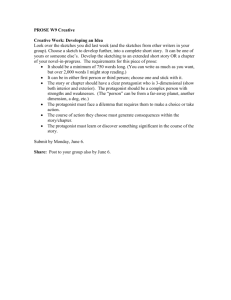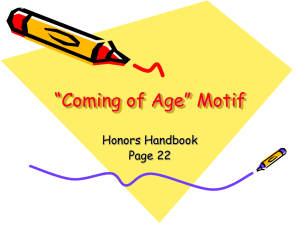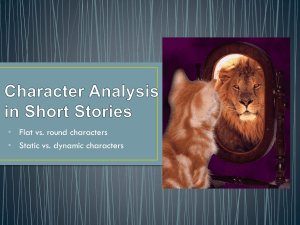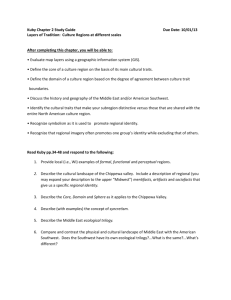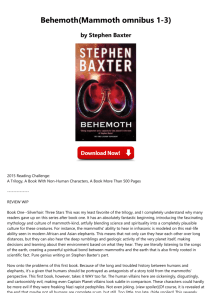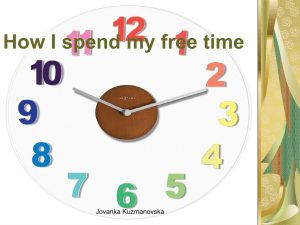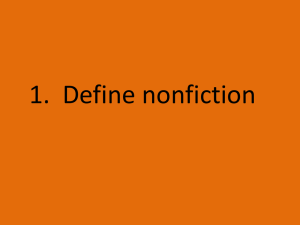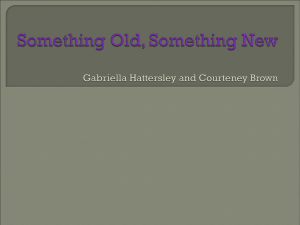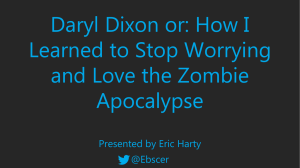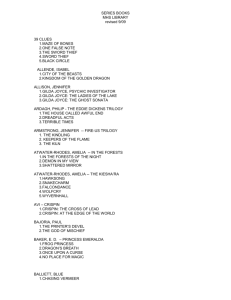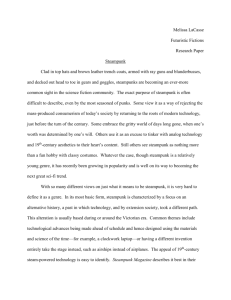10th Grade English Language Arts Summer Reading Assignment
advertisement
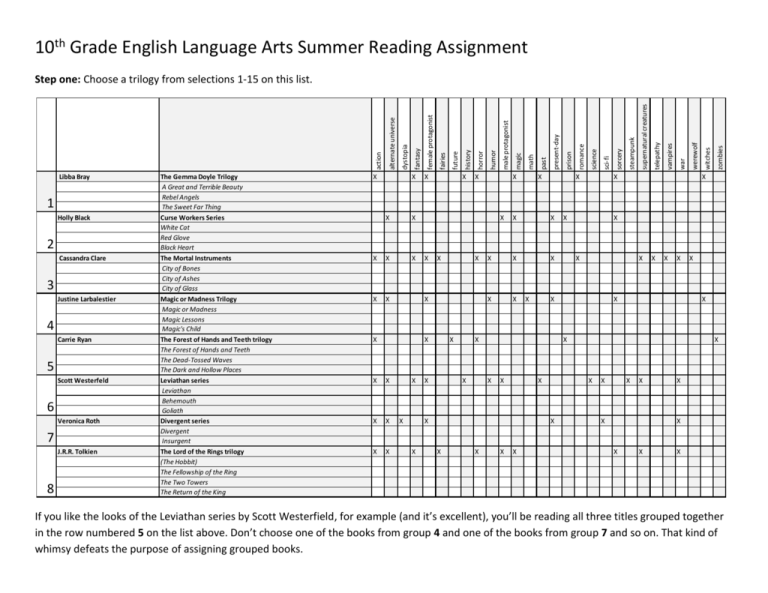
10th Grade English Language Arts Summer Reading Assignment Libba Bray 1 Holly Black 2 Cassandra Clare 3 Justine Larbalestier 4 Carrie Ryan 5 Scott Westerfeld 6 Veronica Roth 7 J.R.R. Tolkien 8 The Gemma Doyle Trilogy A Great and Terrible Beauty Rebel Angels The Sweet Far Thing Curse Workers Series White Cat Red Glove Black Heart The Mortal Instruments City of Bones City of Ashes City of Glass Magic or Madness Trilogy Magic or Madness Magic Lessons Magic's Child The Forest of Hands and Teeth trilogy The Forest of Hands and Teeth The Dead-Tossed Waves The Dark and Hollow Places Leviathan series Leviathan Behemouth Goliath Divergent series Divergent Insurgent The Lord of the Rings trilogy (The Hobbit) The Fellowship of the Ring The Two Towers The Return of the King X X X X X X X X X X X X X X X X X X X X X X X X X X X X X X X X X zombies witches werewolf war vampires telepathy supernatural creatures steampunk sorcery sci-fi science X X X X X X X X X X X X X X X X X X X X romance X X X prison present-day past X X X X math magic male protagonist humor horror X X X X history X X X X future fairies female protagonist fantasy dystopia alternate universe action Step one: Choose a trilogy from selections 1-15 on this list. X X X X X X X X X If you like the looks of the Leviathan series by Scott Westerfield, for example (and it’s excellent), you’ll be reading all three titles grouped together in the row numbered 5 on the list above. Don’t choose one of the books from group 4 and one of the books from group 7 and so on. That kind of whimsy defeats the purpose of assigning grouped books. 9 Kami Garcia and Margaret Stohl 10 Paolo Bacigalupi 11 Melissa Marr 12 James Dashner 13 Kristin Cashore 14 Cherie Priest 15 Ray Bradbury 16 Jane Austen 17 Jane Austen 18 Louisa May Alcott 19 Charlotte Bronte 20 Leo Tolstoy 21 Midnighters series The Secret Hour Touching Darkness Blue Noon Beautiful Creatures series Beautiful Creatures Beautiful Darkness Beautiful Chaos Ship Breakers series: Ship Breakers The Drowned Cities Wicked Lovely series Wicked Lovely Ink Exchange Fragile Eternity Radiant Shadows Darkest Mercy The Maze Runner Trilogy The Maze Runner The Scorch Trials The Death Cure The Graceling Trilogy Graceling Fire Bitterblue Clockwork Century series Boneshaker Dreadnought Ganymede Something Wicked This Way Comes The Martian Chronicles Farenheit 451 Pride and Prejudice Pride and Prejudice and Zombies Sense and Sensibility Sense and Sensibility and Sea Monsters Little Women Little Vampire Women Jane Eyre Jane Slayre Anna Karenina Android Karenina X X X X X X X X X X X X X X X X X X X X X X X X X X X X X X X X X X X X X X X X X X X X X X X X X X X X X X zombies witches werewolf war vampires telepathy X X X X X X X X X X X X X X X X X X X X X X X X X X X X X X X X X X X supernatural creatures steampunk sorcery sci-fi science romance prison X X X present-day past math X X X X magic X X X male protagonist humor horror history future fairies X X X X female protagonist fantasy dystopia alternate universe action Scott Westerfeld X X X X X X X X X X X X X X X X X X X X X X X X X X X X X X X X X X X X X X X X (Or, instead of a trilogy, you might pick a nice novel with monsters or an old classic romance paired with a monsteriffic reboot, as seen in selections 16-21.) You’re responsible for acquiring these books on your own from a store, library, or web source, at your own expense and inconvenience. If you’re in AP World History, stop here for Step two. 22 23 24 25 26 27 28 Jared Diamond Mark Kurlansky William Manchester Louise Levathes Ian Mortimer Tom Standage Regine Pernoud Collapse: How Societies Choose to Fail or Succeed Guns, Germs, Steel Salt Cod A World Lit Only By Fire When China Ruled the Seas The Time Traveler's Guide to Medieval England History of the World in Six Glasses Those Terrible Middle Ages: Debunking the Myths X X X X X X X X X X X X X X X X X X X X X X X X X X X X X X X X X X X X X X X X X X X X X X X zombies witches werewolf war vampires telepathy supernatural creatures steampunk sorcery sci-fi science romance prison present-day past math magic male protagonist humor horror history future fairies female protagonist fantasy dystopia alternate universe action ALL OTHERS SKIP TO Step three. X X X X X X X Step two: (AP World History students) Select a nonfiction title from items 22-28. The nonfiction book you choose will pair well with your summer reading for AP World History, and it will help to hone your global perspective. When you compare the fiction series with the concepts in the nonfiction book, you’ll have a unique outlook on the struggles of the protagonist. Step three: Make sure they’re the right books for you. Now that you’ve got your books picked out, make sure they’re the books for you. Flip through them. If you’re shopping online, most outlets have this feature now. You can read a few pages of your selection before you buy. If not, read the reviews. If you’re shopping in a bookstore, open the book and read a page. Don’t worry about spoilers. Just make sure you find the author’s style interesting, not too complex, and not too simple. Step four: Read the Books. Read all of the books. I can hear you now. “Why? It’s summer! We shouldn’t have to do WORK on our holiday,” you say. Well, just so you know, this is the school’s policy, not my own, but it’s a good idea for many reasons. 1. Over the summer, your brain will lose some of that edge you’ve built up over the year—especially over the past month of rigorous study—if you don’t use it. No one wants to deal with the effects of “summer slide” in August. 2. The selections I’ve picked for you to choose from are books that I hope will be FUN for you to read, and they should STIMULATE YOUR IMAGINATION. I want you to become involved in the life of a fictional character over the summer. 3. The Summer Assignment is GRADED. The grade for this assignment will be the first major grade you receive when school recommences in the fall, so to start off on the right foot, you do NOT want a zero for it. So, now you’re wondering what exactly you’ll be assigned to do once you’ve read the books. Step five: Choose your assignment. 1. The analytical approach: Write a critical analysis of the main character’s evolution throughout the story. As the conflict evolves, how does the character evolve to meet the challenges that face him or her? How does the author keep the reader empathetic to the character throughout these changes? (AP students: How has human history (look at the nonfiction book you read) affected the world the author created for this story and the development of the character’s flaws?) Be insightful. Minimum three pages. 2. The creative writing approach: Continue the story in the style of the original work. Write missing scenes, rewrite an element of the story the reader through should have been different, write from a different character’s point of view, or change the ending of one or more of the books. Keep a journal for a month as a character. (AP students: Keep the historical outlook gained through reading the nonfiction book you selected in mind as you write. Alluding to a historical fact that might be significantly poignant to your character or the world about which you’re writing is encouraged.) Be creative. 1500 to 5000 words, minimum. 3. The multimedia approach: Film a character’s daily life. Make a video brochure of the place where they live or work or are imprisoned. Interview the characters on your talk show. Create a theme song and music video for a scene in one of the books. Be creative. Minimum 4 minutes of media. 4. The fine arts approach: Create artwork, preferably in three-dimensions, to illustrate the books. For example, a fine arts project for the Lord of the Rings trilogy might be a 3D relief map of Middle Earth with hobbits, elves, dwarves, orks, and trees that can be moved around. If your hobby is photography, create a photojournal of a day in the character’s life, capturing images of each place the character goes and attaching it to a board with creative captions. Try other creative media: oil and canvas, graffiti, woodwork, dance, theatre, etc. Be Creative. (Note: Abstract or minimalistic works may require a written explanation of form and substance to accompany the artwork, if so directed by the teacher.) 5. AP students: (This is just an additional option for you, not a REQUIREMENT for AP students.) The historical perspective approach: Let the non-fiction book take the front seat for the assignment. Apply historical knowledge that is new to you toward an understanding of the fiction author’s presentation of human interactions, struggles, conflicts, and treatment of one another in the story. Be insightful. Minimum three pages. Always cite your sources using current MLA standards. Don’t show up to school without this. This assignment will be due on the first day of school. I will ask you for it on the first day of school. If you have forgotten to bring it because of all the hustle and bustle and mania of the occasion, I will remind you to bring it on the second class day. If you don’t have it by then, you’ll receive your first 0 of your high school career.
